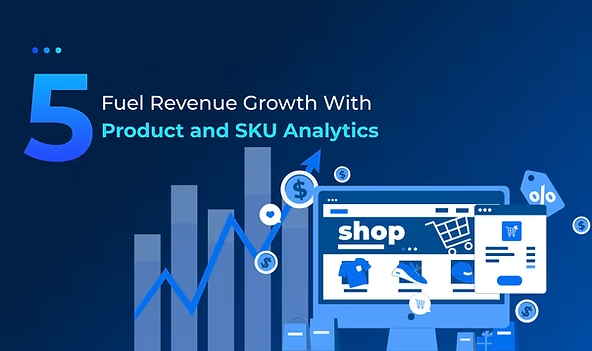
The products driving your success today might not hold the same appeal tomorrow. Trends shift rapidly, and what’s in demand can change overnight, leaving businesses scrambling to keep up.
If you're selling products across multiple categories, pinpointing your true bestsellers can feel like shooting in the dark. Sure, you might make a good guess about what’s working, but without concrete data, it’s tough to know for sure.
As your product lineup grows and the number of SKUs multiplies, this uncertainty only deepens.
How do you decipher which items are genuinely performing well and which ones are lagging behind? That’s where Graas’ product analytics comes into play. It allows you to unlock valuable insights about your products, helping you make informed decisions that can drive revenue growth.
Let’s dive in and explore how Graas’ Product and SKU Analytics can strengthen your approach to inventory management and boost your bottom line!
Graas’ Product / SKU Analytics is an intuitive tool that simplifies understanding the performance of each product or SKU in your lineup.
It’s designed to give you clear, actionable insights, making it easier to make informed decisions on product strategy, marketing, and inventory.
With user-friendly dashboards showing essential metrics—like sales, traffic, and conversion rates—this tool enables you to spot your star performers, identify which items need attention, and fine-tune your approach.
Graas is a comprehensive eCommerce analytics solution designed to tackle the full spectrum of data challenges, from marketing to sales insights.
With Graas’ Product / SKU Analytics, you can leverage powerful analytics to optimize each product in your catalog and make data-backed decisions that drive success.
Here’s how you can use Product / SKU Analytics to maximize the potential of every item you sell.
Graas’ Product / SKU Analytics lets you track and compare product performance across all your sales channels in one place.
Integrating seamlessly with major marketplaces and your own eCommerce store, Graas saves you from the hassle of logging into multiple platforms. Instead, you get a comprehensive view of key product metrics across channels through a single, unified dashboard.
This not only makes it easier to monitor how each product is performing in various stores but also helps identify where specific SKUs are thriving or need adjustments, giving you an edge in optimizing product strategies across all platforms.
Graas’ Product /SKU analytics, quadrant view feature provides a clear classification of each product’s performance into four categories: hero products, high potential products, low performers, and low visibility products.
This view uses metrics like GMV (Gross Merchandise Value) and traffic to organize products, highlighting which ones need your focus.
Your hero and high potential products should receive maximum attention, as they’re already attracting traffic and sales. From here, you can ramp up marketing and advertising efforts for these products to drive further growth or focus on optimizing inventory to meet demand effectively.
Note: By using the Quadrant View, you can identify the perfect product mix that captures the demand and intent of your target audience. This will help you boost not only revenue but also profitability.
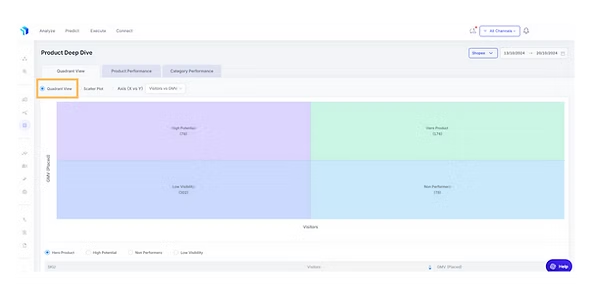
Moreover, Graas’ Category Performance dashboard gives you a detailed view of how each product category contributes to your overall sales.
It highlights the top-performing categories while also pointing out areas that might need a strategic boost. This feature helps you spot growth opportunities across all categories, whether standard marketplace ones or custom categories unique to your business.
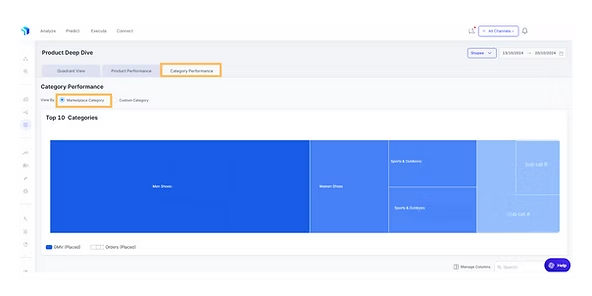
For example, a fashion brand might find that its “Accessories” category is underperforming compared to “Footwear.” By reviewing the traffic and sales data, they can adjust promotions or add new products to improve the Accessories category's visibility and engagement.
The quadrant view in Graas’ Product / SKU Analytics also reveals slow-moving products—those that either attract interest without converting (low performers) or have minimal visibility and sales (low visibility products).
These SKUs tend to sit longer in your inventory, tying up valuable storage and financial resources.
By identifying them early, you can decide whether to invest in strategies that boost visibility, like targeted ads, or to phase them out entirely with clearance sales.
This strategic approach not only clears inventory but also ensures resources are directed towards products with a better return potential.
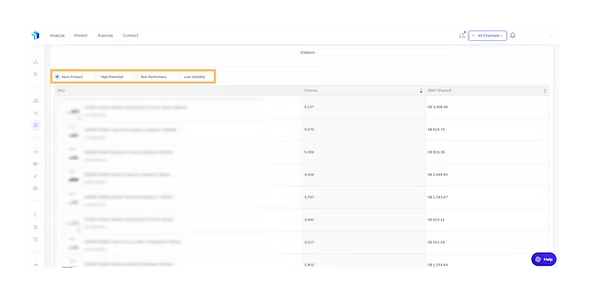
Some products consistently perform better than others, and pricing often plays a crucial role.
Graas’ Product / SKU Analytics provides a scatter plot — from which you can check the cluster where the traffic is the highest — this will help you gauge the interest across different price points, making it easy to analyze pricing effectiveness. This allows you to identify optimal price ranges that drive the most sales while maximizing profitability.
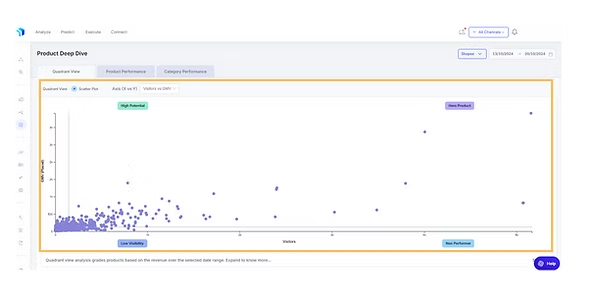
With this insight, you can adjust pricing strategies and test elasticity for each SKU, ensuring your products are priced competitively without sacrificing profit. Fine-tuning pricing based on these analytics gives you a strategic advantage in responding to market demand.
Graas’ Product / SKU Analytics further enhances decision-making by analyzing and tracking seasonal trends for each product across channels.
Through its trend chart comparing GMV and orders over a selectable date range, you can clearly see how demand shifts by season and category.
This data allows you to better plan stock levels, ensuring high-demand items are readily available when needed and avoiding overstocking items during slower periods.
By aligning inventory with seasonal patterns, you’re better prepared to capitalize on peak periods and optimize stock management all year round.
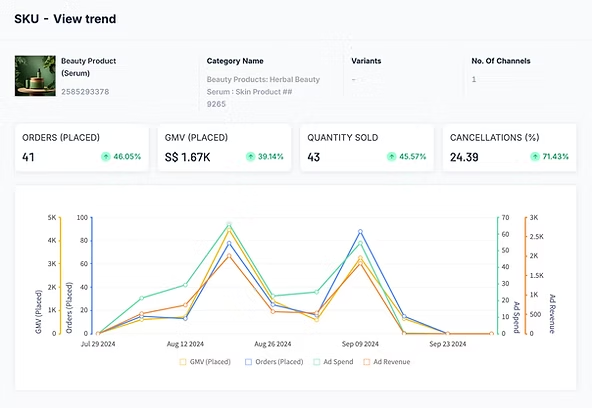
Graas’ Product / SKU Analytics offers a range of metrics like visits, add-to-cart ratios, and conversion rates to help identify which SKUs could use a content update.
By analyzing metrics such as Product Grade, Orders Placed, Product Page Views, Add-to-Cart Units, and Ad Spend, Graas gives a well-rounded view of each SKU’s performance.
The Product Overview feature lets you dive even deeper, analyzing performance at a granular level across Parent, Child, or Parent-Child variations. It gives you a complete picture of each product's lifecycle and buyer journey.
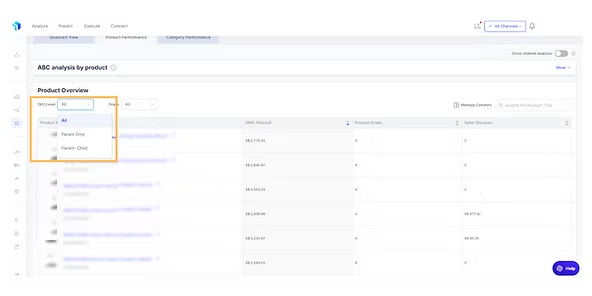
With this insight, you can identify areas for improvement and enhance content to drive higher conversion rates across your product pages.
For example, if a high-traffic product page has a low add-to-cart ratio, it might be time to refresh the product descriptions, update images, or enhance overall content.
Returns can eat into profits, making it essential to monitor return rates for each SKU. Graas’ Product / SKU Analytics allows you to track return frequencies, pinpointing products with higher-than-average returns.
These insights prompt a closer look at potential issues, such as product quality, misleading descriptions, or sizing inaccuracies.
By analyzing and acting on this data, you can reduce return rates, saving costs and improving customer satisfaction.
For instance, if returns are high on a specific product due to fit issues, updating the size guide or adding customer reviews can clarify expectations and reduce returns. However, if it’s due to the quality, you should consider moving on from that product.
Product performance varies across channels due to unique customer behaviors, meaning what sells on Amazon might underperform on Lazada.
Graas helps analyze product performance and identify where each SKU thrives, offering insights to optimize product placement across platforms.
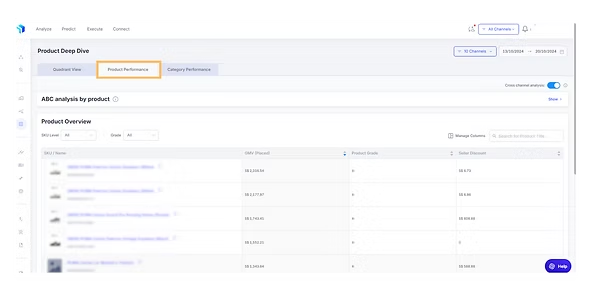
Additionally, by analyzing conversion rates from search versus category views, you can fine-tune on-site merchandising.
This data highlights which products perform well in organic searches and which may need promotion or better categorization to gain visibility.
By understanding which SKUs excel on which channels, you can allocate resources to ensure maximum visibility where it counts.
Graas’ Product / SKU Analytics also lets you analyze SKU profitability to prioritize resources effectively.
By focusing on high-GMV and hero products, you can drive profitability, while reassessing the role of low-visibility items in your assortment.
Allocating more budget and marketing efforts to high-margin products helps to increase both revenue and profit.
This approach enables you to maximize the return on your investment by focusing on products with the best sales and margin potential, creating a balanced portfolio that drives sustainable growth across your eCommerce platform.
Graas’ Product SKU / Analytics enables you to perform an ABC analysis, categorizing SKUs by their revenue contribution to optimize resource allocation.
In this framework, A-grade products represent your top earners, often making up around 80% of your revenue. These best-sellers should be continuously optimized to sustain strong performance.
B-grade products, contributing about 15% of revenue, hold potential for growth—strategically adjusting their promotion or pricing can help them break through.
Meanwhile, C-grade products account for the remaining 5% and often struggle. For example, you might consider placing these on sale or phasing them out altogether to streamline inventory.

Graas' Product / SKU Analytics provides businesses with the tools needed to unlock the true potential of their products, driving revenue growth through data-driven insights.
By analyzing key performance metrics, identifying product categories, and optimizing marketing strategies, eCommerce brands can maximize their profitability and thrive in a competitive landscape.
Signup for a 30 Day Free Trial.